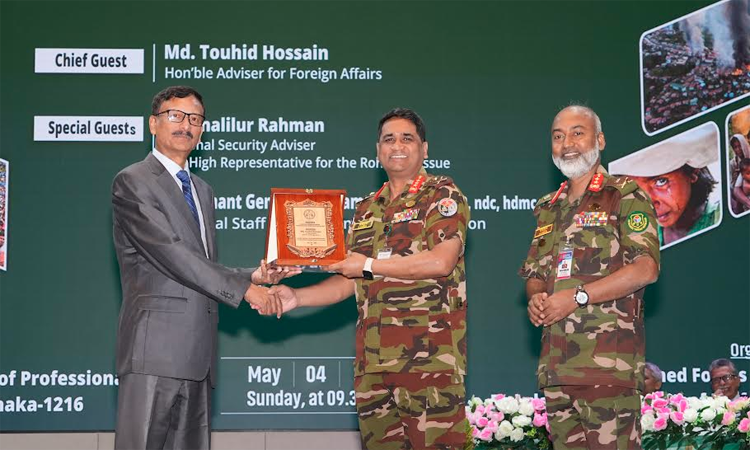
DHAKA, May 4, 2025 (BSS) - Foreign Adviser Md Touhid Hossain today warned that the prolonged Rohingya crisis is an escalating threat to both Bangladesh and regional stability, urging stronger international action for a durable lasting solution to the crisis.
“We’ve not yet found a viable solution to this crisis, despite it burdening us for a very long time,” he said, describing the future of Rohingya repatriation as grim due to Myanmar's internal situation.
He made the remarks while addressing a seminar titled "Repatriation of Rohingya in Bangladesh: Strategic Implications on Regional Security and Ways Ahead," jointly organised by the Armed Forces Division (AFD) and the Bangladesh University of Professionals (BUP) in the capital.
National Security Adviser and High Representative to the Chief Adviser Khalilur Rahman and AFD’s Principal Staff Officer Lieutenant General SM Kamrul Hassan attended as special guests.
Calling the Rohingya issue a "very long-drawn problem," Touhid Hossain said the displaced population must be allowed to return to their homeland voluntarily, with full rights and guarantees of security.
“They (Rohingyas) will not return to a place where their lives are at risk and their rights denied. At least in the camps here, there is a measure of safety,” he said.
The adviser reminded that the 2017 exodus was not the first wave of Rohingya displacement.
“Even before that, nearly 300,000 crossed over in a slow, continuous manner. This is a long-standing crisis,” he said.
Since August 25, 2017, over 700,000 Rohingyas fled to Bangladesh in the face of brutal crackdowns by the Myanmar military in Rakhine state.
Bangladesh is now hosting more than 1.3 million Rohingyas in the camps of Cox’s Bazar and on Bhasan Char Island, but not a single Rohingya has been repatriated in eight years.
Touhid noted that although Bangladesh made early efforts through bilateral diplomacy, the approach has yielded no tangible results.
Criticising Bangladesh’s early reliance on bilateral diplomacy, the adviser said, many including him had warned that such efforts would prove fruitless.
“The intent was different this time. It was a calculated move by a military regime to permanently eliminate the Rohingya population from their territory,” he said.
“We cannot abandon diplomacy … we cannot stop bilateral negotiations but let us not be very hopeful of bilateral negotiations leading it to repatriation,” he said.
Touhid identified Myanmar’s fractured internal political structure—comprising the military junta, the Arakan Army (AA), and the National Unity Government (NUG)—as a major impediment to repatriation.
Touhid emphasised that any sustainable repatriation effort must include all stakeholders, particularly the Arakan Army, which now controls large parts of Rakhine State.
Warning of the dangers of prolonged displacement, Touhid Hossain said the long stay in camps has created fertile ground for unrest.
“It is unrealistic to expect one million people—half of them youngsters—to remain peaceful indefinitely,” he said, adding, “This unresolved crisis risks fuelling radicalisation and destabilising the region.”
He called on the international community to keep the Rohingya crisis on the global agenda despite other ongoing conflicts.
“I call on all of you to remain committed and work towards a durable, just solution,” he added.
Praising recent international attention to the issue, he termed UN Secretary-General António Guterres’s visit and remarks on the Rohingyas as a welcome development but urged for more sustained global engagement.
National Security Adviser Khalilur Rahman said that Dhaka has not agreed to any "humanitarian corridor" into Myanmar's war-torn Rakhine State, calling the term "misleading" and "misused".
Khalilur clarified that even the UN secretary-general did not use the term "corridor", which he said carries specific implications.
He said that Dhaka has not discussed “any humanitarian corridor” and no decision has been made on this or no consensus has been reached with any party on this.
BUP Vice Chancellor Major General Md Mahbub-ul Alam delivered the welcome address.
The Principal Staff Officer of the Armed Forces Division, in his remarks, highlighted the growing influence of the Arakan Army in Myanmar’s Rakhine State and the absence of Myanmar’s government authorities in the border areas.
He emphasized the need for bilateral initiatives along with coordinated support from the international community and regional partners to achieve a sustainable solution to the Rohingya crisis.
Professor Shahab Enam Khan, an international relations scholar at Jahangirnagar University and national security analyst, delivered the keynote at the seminar.